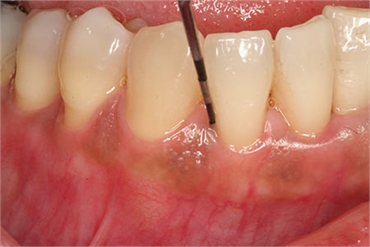PERIODONTAL GUM POCKETS TREATMENT
January 05, 2021, Manhattan Periodontics and Implant Dentistry

One of the main signs of gum disease is the development of pockets or spaces around teeth as the gums lose their firm attachment to teeth. These spaces or gaps are called periodontal pockets. When periodontal pockets develop, gums are more likely to bleed, letting harmful bacteria into your bloodstream. These inflammatory bacteria can then negatively affect general health, increasing the risk of or worsening existing health problems.
New York periodontist Dr. Rahmani provides a full range of periodontal procedures to treat periodontal gum pockets. Our state of the art facility equipped with the most advanced periodontal equipment available in USA including latest lasers & high precision microscopes.
What Are Periodontal Gum Pockets?
When you visit your dentist for regular checkups you might be aware they gently probe your gums, and you may hear them reading out various measurements to their assistant.
Your gums are probed using a special instrument to see if they bleed at all, as healthy gums should not bleed when probed.
The dental probe is inserted into the small space in between your gum and tooth to measure the overall depth. If you have healthy gums, this depth will be around 3 mm, but any greater could indicate periodontal disease (see: periodontal disease symptoms).
Explaining Periodontal Pockets
You won’t be able to see if your gums have periodontal pockets as they are invisible to the naked eye but they are visible to your dentist who will carefully check them during a dental examination. To do this they will accurately measure the space in between your gums and teeth using what’s called a periodontal probe. This is a slim instrument that is gently inserted in the gap between your teeth and gums, allowing your dentist to measure the depth of this gap in millimeters.
When your gums are probed, it may make unhealthy gums bleed slightly but you shouldn’t feel too much discomfort. These readings provide your dentist with an accurate picture of your gum health.
Healthy gums have a gap of between 1 mm and 3 mm. A gap of between three and 5 mm indicates the very first signs of periodontal disease. If the gap is between five and 7 mm then you have moderate periodontal disease. A gap of 7 to 10 mm or more indicates advanced periodontal disease.
As you can see, even healthy gums have a very slight gap which is called a sulcus and this space can easily collect bacteria and food particles. However, because the space is quite shallow bacteria and food debris can easily be removed by brushing and flossing. Unfortunately, a toothbrush cannot reach any more than two or 3 mm below the gum line and when periodontal pockets are deeper than bacteria and food debris can gradually build up increasing the inflammation and swelling in your gums as the infection worsens.
When this space does become infected then you may well hear your dentist saying you have periodontal pockets and without treatment the bacteria will continue to thrive and multiply, causing more bone loss around your teeth while destroying the ligaments holding your teeth in place.
Read more: https://www.periony.com/periodontal-gum-pockets-treatment-in-midtown-manhattan-nyc/
Please contact Manhattan Periodontics & Implant Dentistry office for consultation with a top periodontics and laser specialist by the number (212) 644-4477.
Working Hours:
Monday - Thursday: 8am - 6pm
Friday: 8am - 2pm
Saturday, Sunday: Closed
Payment: cash, check, credit cards.
Manhattan Periodontics & Implant Dentistry
121 East 60th St, Ste 6C1,
New York, NY 10065
(212) 644-4477
Web-address: https://www.periony.com
E-mail: info@periony.com
Google maps: https://g.page/periodontist-nyc
https://plus.codes/87G8Q27J+8M New York
Nearby Locations:
Upper West Side | Upper East Side | Lenox Hill | Diamond District | Hell's Kitchen
10023, 10024, 10025 | 10021, 10028, 10044, 10065, 10075, 10128 | 10036 | 10019

